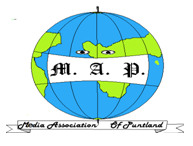Garowe, September 30: The Media Association of Puntland (MAP) supported by the National Endowment for Democracy (NED) successfully concluded yesterday a 4-day media training on elections reporting, ahead of the anticipated Puntland’s local government elections to be held in 47-districts for the first time in 50 years.
A democratic system is more resilient when fair and balanced media coverage of elections promotes openness, gives access to the exchange of information and knowledge, encourages an inclusive electoral process, and acts as a productive venue for public discussion. Recognizing the urgency of the hour, especially given that the majority of local journalists have never witnessed voters casting ballots to elect their government representatives, MAP believes it is critical to sharpen their professional skills.
The extensive course was held in Garowe and was attended by 35 Puntland journalists drawn from Radio, TV, and print media operating in the towns of Burtinle, Galkaio, Bosaso, Badhan, Dhahar, and Buhoodle.
At the inaugural ceremony of the course, MAP invited Mr. Abdirisak Ahmed Said, head of the Transitional Puntland Electoral Commission (TPEC), the body responsible for overseeing local elections, voter registration, and political parties’ registration. Additionally, Eng. Mohamed Issa, Director general of Puntland’s Ministry of Information was among the guest speakers at the opening session of the workshop.
In his opening remarks, Mohamed Dahir, Chair of MAP, welcomed participants and gave an overview of the objectives of the training. He briefed the assembled participants and the guest speakers on the MAP’s commitment to contributing to the ongoing local democratization processes.
” The cornerstone of this 4-day program aims to enhance the skills of 35 journalists in covering local elections, with tailored modules that will educate participants on the electoral process and the state governing laws in place. He added, ” I urge the participants to commit their time to learn the knowledge this course contains, as doing so will make it easier to inform voters and cover elections’’, Said Dahir, Chair MAP.
Dahir also used the platform to send a message to the stakeholders involved in the electoral process that MAP is geared up in ensuring that the local journalists are prepared to take up the tasks both ethically and professionally.
” To the many stakeholders engaged in the TPEC-led local democratization process, I want you to be assured that MAP and its state-wide membership (media outlets and journalists) are fully committed to and poised to benefit the process”, Said MAP’s chair, Mohamed Dahir, in his opening remarks.
The TPEC’s Head, Abdirizak, acknowledged the MAP’s working relationships with TPEC in terms of preparing the mainstream media to professionally execute their journalistic tasks of educating and informing the public, especially at this critical juncture, as Puntland aims to transition to a democratic society in which citizens can elect their representatives.
“I’d like to commend MAP on their continued efforts over the years to strengthen the professional skills of journalists, as well as their collaboration with TPEC on media-related issues.”
Adding, I also want to use this opportunity to emphasize that the traditional media play a critical role in public voter education and covering the elections for any society, but it is especially important for Puntland because the majority if not all of its citizens will be first-time voters. We urge you to take a patriotic stance on the several roles the media will play in the upcoming municipal elections, especially by making sure that coverage is impartial and accurate”, Said Abdirisak Ahmed Saed, Head of the Puntland Transitional election commission (TPEC).
The lead trainer, Burhan Dahir, provided participants with a wide range of modules covering election coverage and safety; awareness of the local electoral law, electoral structure, and processes; citizen’s needs for election information; media techniques to counter hate speech; and reporting throughout the campaign cycle, as well as how to effectively prepare to cover election campaigns and processes.
The majority of participants noted in their feedback on the post-evaluation forms that they found the course to be very satisfying and that it gave them the chance to learn specific skills that would enhance their reporting abilities in addition to providing them with a thorough understanding of the context in which the upcoming local government elections will take place.
End










